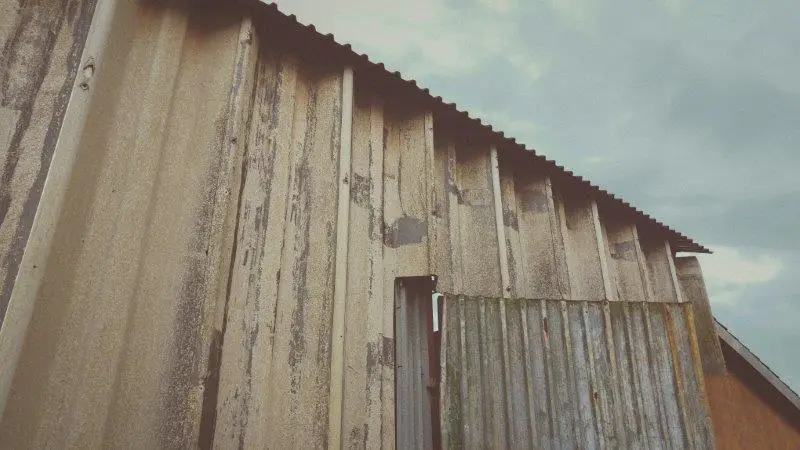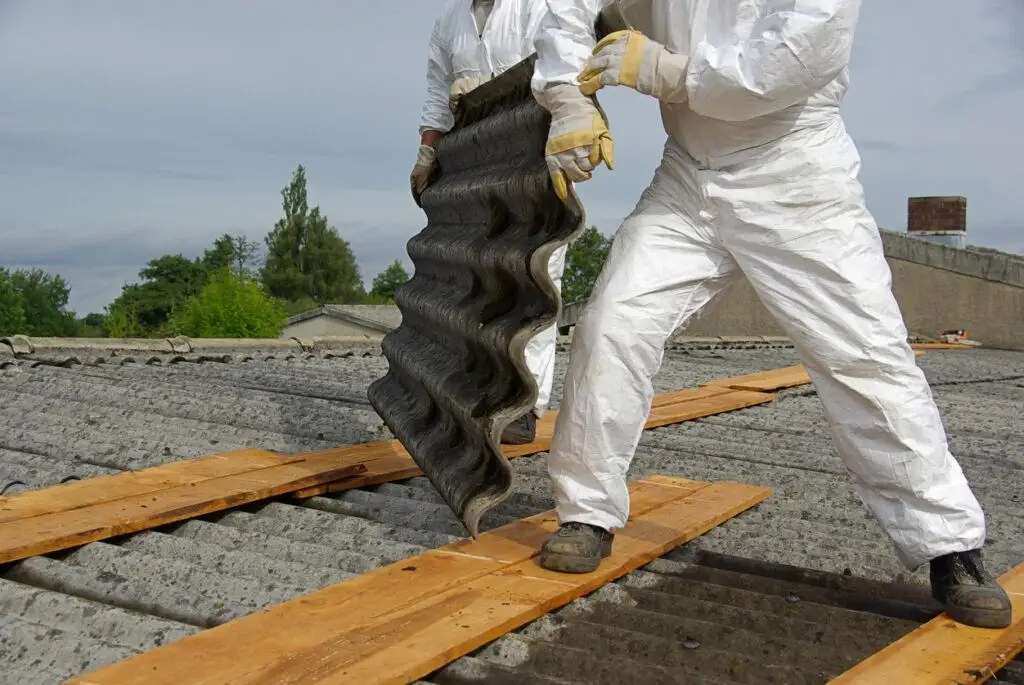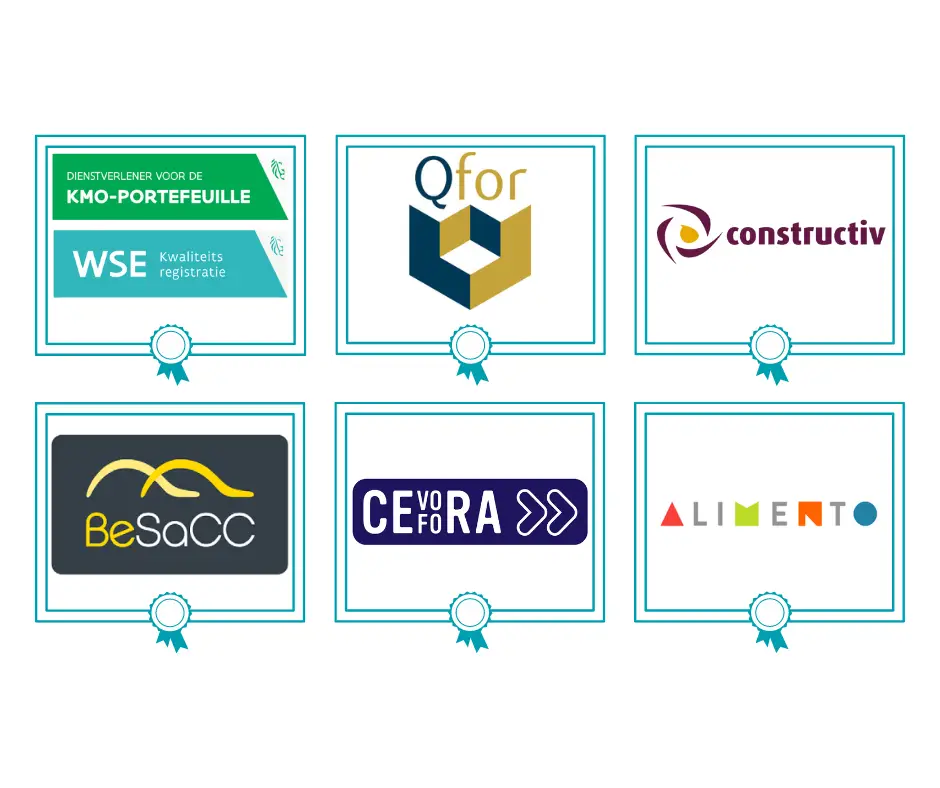Opleiding asbest:
eenvoudige handelingen
Over asbest
Asbest is een gevaarlijke stof die in het verleden op grote schaal werd gebruikt in de bouwsector vanwege zijn uitstekende isolerende, brandwerende en verstevigende eigenschappen. Hoewel het gebruik van asbest sinds 2001 in België verboden is, blijft het nog steeds aanwezig in tal van gebouwen en installaties. Het correct hanteren van asbesthoudende materialen is daarom van cruciaal belang om gezondheidsrisico’s te vermijden.
Asbest kent verschillende vormen en toepassingen, waardoor het niet altijd eenvoudig identificeerbaar is. Het is een gevaarlijke stof die in het verleden veelvuldig werd gebruikt in bouwwerken, industriële installaties, …
De opleiding Asbest: eenvoudige handelingen is ontworpen om professionals te leren veilig om te gaan met asbest tijdens kleine werkzaamheden.
Tijdens onze opleiding leer je inzicht te krijgen in de gevaren en risico’s die samenhangen met asbest. We leren je specifieke technieken en regels aan voor een veilige asbestverwijdering van hechtgebonden toepassingen. Ontdek hoe we jou kunnen voorbereiden op een bewuste omgang met asbestverwijdering.

Duurtijd
De basisopleiding duurt 8 uur en vindt plaats op één dag in jouw bedrijf.
Jaarlijkse bijscholing van 8 uur is verplicht.
Deelname-attest
Na de opleiding en interne proef voorzien wij een deelname-attest voor alle geslaagde deelnemers.
Kostprijs
€ 1295 excl. BTW (totaal) en verplaatsingskosten per opleidingsdag
voor maximaal 15 deelnemers.
Veilig en verantwoord werken met asbesthoudende materialen
Met de opleiding asbest: eenvoudige handelingen kunnen professionals op een veilige en verantwoorde manier omgaan met asbest. Door de juiste kennis en bescherming toe te passen, kunnen zij helpen om de gezondheidsrisico’s voor henzelf en anderen te minimaliseren. Deze opleiding geeft hen de tools om asbest op een wettelijk correcte manier te herkennen en te hanteren, zodat er geen gevaarlijke situaties ontstaan tijdens hun werk.
Tijdens de cursus leren deelnemers onder meer asbest te herkennen, veiligheidsmaatregelen te treffen en asbestvezels te vermijden. Het doel is de deelnemer te voorzien van de juiste kennis en vaardigheden om veilig kleine ingrepen uit te voeren, zoals het vervangen van een asbesthoudende dakpan of het boren van gaten in een asbesthoudende muur.
Onze opleidingen richten zich op het begrijpen van de risico’s en gevaren van besloten ruimtes, evenals op het aanleren van methoden om met deze risico’s om te gaan.

Wat is asbest?
Asbest is een natuurlijk mineraal dat bestaat uit microscopisch kleine, vezelachtige kristallen. Deze vezels zijn bijzonder sterk, slijtvast en bestand tegen hitte en chemicaliën. Hierdoor werd asbest vroeger veel gebruikt in de bouwsector, bijvoorbeeld in daken, gevelbekleding, leidingen en isolatiemateriaal.
Hoewel het materiaal op het eerste gezicht onschadelijk lijkt, wordt het gevaarlijk wanneer de asbestvezels vrijkomen in de lucht. Dit gebeurt bijvoorbeeld bij breken, zagen of boren in asbesthoudend materiaal. Ingeademde asbestvezels kunnen ernstige gezondheidsproblemen veroorzaken, zoals longkanker, asbestose (stoflongen) en mesothelioom, een zeldzame vorm van kanker aan het long- of buikvlies. Deze ziektes treden vaak pas jaren na blootstelling op, wat het belangrijk maakt om blootstelling van meet af aan te voorkomen.
Onze boekingsmethode
Boeken kan zowel via via e-mail of telefoon.
Als je gebruik wil maken van de KMO-portefeuille, vul dan onderstaand formulier in, i.p.v. via ons online platform te gaan.
Indien je meer informatie wenst of ondersteuning nodig hebt kan je ons steeds vlot bereiken!
In-company opleiding
-
Een in-company opleiding voor jouw bedrijf?
-
Vul het onderstaande contactformulier in.
-
We nemen zo snel mogelijk contact met je op.
Eenvoudige handelingen
Bedrijven krijgen soms te maken met zeer specifieke gevaren, zoals het hanteren van asbest, kwartsstof en andere chemische en carcinogene stoffen. Er bestaat geen twijfel over de mogelijke gevaren van asbest of asbesthoudende materialen. Sinds het Koninklijk Besluit van 2006 zijn alle bouwvakkers die in aanraking komen met asbest of asbesthoudende materialen verplicht om een opleiding te volgen over de behandeling van dit materiaal.
Soms vormt de omgeving zelf het grootste risico, bijvoorbeeld door een smalle toegang, besloten ruimtes of omdat deze niet is ontworpen zijn voor een kort of normaal verblijf.
Het inademen van losse asbestvezels brengt aanzienlijke gezondheidsrisico’s met zich mee. Daarom is het essentieel om persoonlijke beschermingsmiddelen te gebruiken.
De opleiding asbest: eenvoudige handelingen is specifiek gericht op professionals die tijdens hun werk sporadisch met asbest of asbesthoudende materialen in aanraking komen. Dit kan bijvoorbeeld voorkomen bij onderhouds- en herstellingswerkzaamheden in oude gebouwen waar asbesthoudende materialen aanwezig zijn. Denk aan klusjesmannen, elektriciens, loodgieters en andere technische beroepen. Deze opleiding leert hen hoe ze eenvoudige handelingen met asbesthoudend materiaal kunnen uitvoeren zonder dat er gevaar ontstaat voor hun eigen gezondheid of die van anderen.

Belgische wetgeving over asbest
In België werd asbest pas in 2001 volledig verboden, hoewel het gebruik ervan al sinds de jaren 1990 aan banden werd gelegd. Dit betekent dat veel gebouwen die vóór deze periode werden opgetrokken, mogelijk nog asbest bevatten. Daarom blijven de regels rond het identificeren, beheren, slopen en verwijderen van asbest cruciaal om blootstelling en gezondheidsrisico’s te vermijden.
De Belgische wetgeving rond asbest is vastgelegd in verschillende reglementeringen, waaronder het Koninklijk Besluit van 16 maart 2006 dat de bescherming van werknemers tegen asbest voorschrijft. Volgens deze wetgeving is het verplicht om een risicoanalyse uit te voeren voordat er werkzaamheden plaatsvinden in een gebouw waar mogelijk asbest aanwezig is. Ook moeten werknemers die met asbest in aanraking kunnen komen, een specifieke opleiding volgen om hen bewust te maken van de risico’s en de juiste procedures te leren.
Daarnaast is er het Asbestafbouwplan 2022-2034, dat erop gericht is om België tegen 2034 asbestveilig te maken. Dit betekent dat asbest zoveel mogelijk uit de gebouwen en infrastructuur moet worden verwijderd, vooral op plaatsen waar mensen dagelijks in contact kunnen komen met asbestvezels.
Verwijdering van asbest
Het slopen en verwijderen van asbesthoudend materiaal is onderworpen aan strenge regels in België. Enkel erkende en gecertificeerde asbestverwijderaars mogen werken uitvoeren die gepaard gaan met het slopen en verwijderen van grote hoeveelheden asbest. Voor kleinere handelingen is het echter toegestaan om, mits een juiste opleiding en bescherming, zelf handelingen uit te voeren.
Daarnaast is er een meldingsplicht voor het verwijderen van asbest. Voordat er gestart kan worden met de verwijdering, moet een melding worden gedaan bij de bevoegde autoriteiten. Ook moet een asbestinventaris opgemaakt worden door een gecertificeerde inspecteur voor gebouwen die vóór 2001 zijn opgetrokken. Deze inventaris geeft een overzicht van waar asbest aanwezig is en in welke toestand het verkeert.

Prevom: een erkende opleidingspartner
Wij hechten veel waarde aan de kwaliteit van onze opleidingen. Daarom doen we er alles aan om die hoge kwaliteit te blijven garanderen.
Prevom heeft verschillende kwalificaties en erkenningen behaald dankzij deze proactieve houding.
Meer informatie over al onze erkenningen en opleidingen vind je hier.

Prevom is een erkend dienstverlener in het kader van de KMO-portefeuille.
Dankzij deze erkenning kan uw onderneming gebruik maken van financiële tegemoetkomingen vanuit het KMO-P voor onze opleidingen.
DV.O245622
Prevom is eveneens erkend dienstverlener door WSE (Werk & Sociale Economie) van de Vlaamse overheid. Hierdoor geeft onze opleiding PAIII recht op Vlaams opleidingsverlof. Erkenningsnummer: ODB-1002616
Prevom heeft een succesvolle Qfor-audit doorlopen.
Dit kwaliteitslabel (gericht op opleidingen en consultancy) is indicatief van de kwaliteit van onze opleidingen.
Wij engageren ons op verschillende manieren om de kwaliteit van onze opleidingen te garanderen.
Prevom is een door BeSaCC erkend examencentrum. Dit betekent dat Prevom officieel examens mag afnemen voor persoonlijke VCA certificaten (VCA basis en VCA VOL).
Prevom werkt samen met verschillende organisaties in de bouwsector.
Zo komen onze klanten voor bepaalde relevante opleidingen (zoals de veiligheidsopleiding voor de bouwsector) in aanmerking voor een premie.
Als bediende die tot paritair comité 200 behoort, krijg je financiële ondersteuning van Cevora en kan je een opleidingssubsidie aanvragen.
Alimento groepeert de sectorale diensten die onder beheer van de sociale partners worden aangeboden aan de werknemers en de werkgevers van de voedingsindustrie (PC 118 en PC 220).

Frequent gestelde vragen
opleiding asbest: eenvoudige handelingen (FAQ)
- Minstens 18 jaar zijn
- Medisch geschikt zijn
- De taal van de opleiding meester zijn
Deze opleiding is voor mensen die sporadisch of regelmatig met asbest in contact komt, en zijn verplicht tot het volgen van een gepaste opleiding. De opleiding richt zich tot de personen die asbest of asbesthoudende materialen slopen en verwijderen. Specifiek via de techniek van de eenvoudige handelingen waarbij het risico op vrijkomen van asbest erg beperkt is.
De cursus asbest eenvoudige handelingen behandelt verschillende belangrijke onderwerpen, waaronder:
- Herkennen van asbesthoudende materialen: hoe identificeer je asbest in gebouwen en structuren?
- Gezondheidsrisico’s van asbesthoudende producten: wat zijn de potentiële gevaren van blootstelling aan asbestvezels?
- Persoonlijke beschermingsmiddelen (PBM): welke beschermingsmaatregelen zijn verplicht bij het werken met asbest?
- Gepast en veilig handelen: welke technieken kun je gebruiken om veilig te werken in de buurt van asbesthoudend materiaal?
- Wet- en regelgeving: welke wettelijke vereisten zijn van toepassing op het werken met en verwijderen van asbest in België?
- Inzichten verwerven in asbest problematiek.
Dit kan op verschillende manieren.
Stuur ons een e-mail, bel ons op 03 369 72 73 of contacteer ons via ons contactformulier onderaan.
Asbest kent verschillende vormen en toepassingen, waardoor het niet altijd eenvoudig identificeerbaar is. Het is een gevaarlijke stof die in het verleden veelvuldig werd gebruikt in bouwwerken, industriële installaties, …
Tijdens onze opleiding leer je inzicht te krijgen in de gevaren en risico’s die samenhangen met asbest. We leren je specifieke technieken en regels aan voor een veilige asbestverwijdering van hechtgebonden toepassingen. Ontdek hoe we jou kunnen voorbereiden op een bewuste omgang met asbestverwijdering.
De deelnemer die slaagt …
- kent de veiligheidsfunctie van asbest verwijderen onder eenvoudige handelingen.
- weet wat een verwerkvergunning is.
- kent de verschillende hechtgebonden toepassingen.
Volgende veiligheidsvoorschriften zijn gekend:
- De correcte specifieke PBM’s (witte overall, P3 masker en specifieke handschoenen).
- Het afbakenen van de werkplaats & signalisatie.
Een beamer en scherm zijn nodig voor deze opleiding asbest. We vragen aan de klant om deze te voorzien. Is dat niet mogelijk, laat het ons dan weten.
De locatie voor deze opleiding kan door de klant worden voorzien maar wij kunnen ook voor een opleidingsruimte zorgen indien gewenst. Een jaarlijkse bijscholing van 8 uur is verplicht.
De opleiding duurt 1 dag.
Na de basisopleiding is er het examen. Het examen bestaat enkel uit theorie rond asbest en de mogelijke gevaren bij asbesthoudende producten.
Het theoretisch examen duurt ongeveer 30 minuten.
Na het afronden van de opleiding ontvangen deelnemers een officieel certificaat dat hen in staat stelt eenvoudige handelingen met asbest op een veilige en wettelijk correcte manier uit te voeren.
Je ontvangt een deelname-attest van Prevom. Op dit attest staat dat je de opleiding succesvol hebt voltooid.
Als je jouw attest bent kwijtgeraakt, bespreek je dit best met je werkgever. Zij kunnen vervolgens contact opnemen met Prevom.
Wij rekenen €30 administratieve kost aan om een nieuw attest op te maken.
Nee, deze opleidingen zijn exclusief voor bedrijven en organiseren we in-company.
Wij bieden graag een oplossing op maat van jouw bedrijf.
Onze experts verplaatsen zich overal in Vlaanderen om jouw personeel een kwalitatieve opleiding te geven.
Prevom is een erkend dienstverlener in het kader van de KMO-portefeuille: DV.O245622
Dankzij deze erkenning kan uw onderneming gebruik maken van financiële tegemoetkomingen vanuit het KMO-P voor onze opleidingen.
Als je hiervan gebruik wil maken, vul dan onderstaand formulier in, in plaats van ons online platform te gebruiken, en duid aan dat je de KMO-portefeuille wil gebruiken. Dan zorgen wij voor de rest.
Prevom hanteert een eerlijk en transparant beleid voor haar opleidingen – er zijn dus geen verborgen of bijkomende kosten.
Zowel professionele als particuliere klanten ontvangen steeds een geldige BTW factuur.
Indien de klant niet opdaagt (no-show) of een annulering doorvoert, blijft de inschrijvingskost of het factuurbedrag volledig verschuldigd. Hetzelfde geldt wanneer de klant verzoekt om de afspraakdatum te verplaatsen binnen een termijn van twee weken voorafgaand aan de geplande afspraak. De klant heeft het recht om de opleiding éénmalig kosteloos te verplaatsen, op voorwaarde dat dit verzoek minstens twee weken vóór de geplande datum wordt ingediend.
Als u niet deelneemt aan het examen of opleiding, kan u eveneens géén certificaat/attest bekomen. Om een certificaat/attest te bekomen moet u uiteraard slagen voor het examen/interne proef.
Wij proberen er uiteraard voor te zorgen dat er nooit een examen- of opleidingsmoment door Prevom moet worden geannuleerd. Mocht dit door uitzonderlijke redenen of extreme omstandigheden toch gebeuren, dan stellen we u hier telefonisch of via mail van op de hoogte.
Het inschrijvingsgeld betalen we in geval van annulatie volledig terug, zonder enige bijkomende vergoeding bovenop het initieel bedrag dat u betaalde bij jouw boeking.
Als op de dag van de opleiding blijkt dat de praktijk niet op een veilige manier kan uitgevoerd worden, behouden wij het recht op de opleiding te staken zonder terugbetaling van het verschuldigde bedrag.

Plan jouw opleiding
Prevom organiseert de perfecte opleiding asbest eenvoudige handelingen voor jouw onderneming.
Benieuwd naar de mogelijkheden?
Contacteer ons voor meer informatie over deze of één van onze andere opleidingen.
